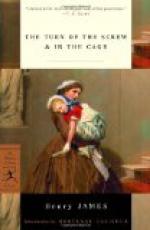Our young woman had a sense that if that view could only be put before her with a particular sniff for poor Mr. Mudge she should hate it as much as she morally ought. She was conscious of not, as yet, hating it quite so much as that. But she saw that Mrs. Jordan was conscious of something too, and that there was a degree of confidence she was waiting little by little to arrive at. The day came when the girl caught a glimpse of what was still wanting to make her friend feel strong; which was nothing less than the prospect of being able to announce the climax of sundry private dreams. The associate of the aristocracy had personal calculations—matter for brooding and dreaming, even for peeping out not quite hopelessly from behind the window-curtains of lonely lodgings. If she did the flowers for the bachelors, in short, didn’t she expect that to have consequences very different from such an outlook at Cocker’s as she had pronounced wholly desperate? There seemed in very truth something auspicious in the mixture of bachelors and flowers, though, when looked hard in the eye, Mrs. Jordan was not quite prepared to say she had expected a positive proposal from Lord Rye to pop out of it. Our young woman arrived at last, none the less, at a definite vision of what was in her mind. This was a vivid foreknowledge that the betrothed of Mr. Mudge would, unless conciliated in advance by a successful rescue, almost hate her on the day she should break a particular piece of news. How could that unfortunate otherwise endure to hear of what, under the protection of Lady Ventnor, was after all so possible.
CHAPTER IX
Meanwhile, since irritation sometimes relieved her, the betrothed of Mr. Mudge found herself indebted to that admirer for amounts of it perfectly proportioned to her fidelity. She always walked with him on Sundays, usually in the Regent’s Park, and quite often, once or twice a month he took her, in the Strand or thereabouts, to see a piece that was having a run. The productions he always preferred were the really good ones—Shakespeare, Thompson or some funny American thing; which, as it also happened that she hated vulgar plays, gave him ground for what was almost the fondest of his approaches, the theory that their tastes were, blissfully, just the same. He was for ever reminding her of that, rejoicing over it and being affectionate and wise about it.




